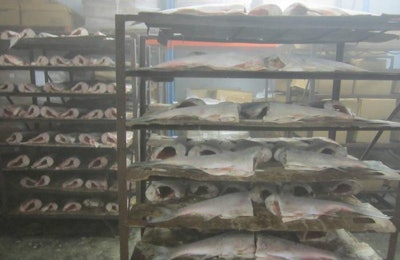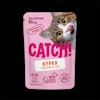
Asian carp have joined the growing list of novel protein sources for pet foods. Chicago-based BareItAll Petfoods makes dog treats from Asian carp, a group of non-native fish that threaten North America’s ecology and economy.
Several species of Asian carp invaded US waterways during the past few decades. Now, the fish compete with native species and disrupt commercial fishing. One species, the meter-long silver carp, leaps from the water when startled and can injure boaters. However, these same problematic fish are a prized delicacy in their East Asian homeland. Plus, the fish contain lean protein and omega-3 fatty acids, but don’t contain high levels of mercury, arsenic or other pollutants.
Co-founder of BareItAll, Logan Honeycutt, told Petfood Industry that he credits the treats with reducing the skin and fur problems suffered by his pit bull/English bulldog mix, Dahlia. His veterinarian recommended a fish oil supplement when Dahlia developed a bald spot on her tail, but instead he gave Dahlia the Asian carp treats. After less than two months, the dog had regrown the patch of fur and was itching less.
Ecological problem, economic solution
Honeycutt noted that making dog treats from Asian carp has benefits beyond canine health. By finding ways to use the fish, Honeycutt believes that economic forces may halt what nature could not.
“These fish are really good for you and your pets but horrible for the environment,” Honeycutt said. “No predators are equipped to handle a full-grown Asian carp. We truly believe that a market-based solution is the best way to impact their population. Everyday consumers can take part and drive some change… We saw that the focus was on human consumption and wanted to take advantage of the pet market.”
Making economic use of Asian carp was why the fish were brought to the US in the first place. Voracious Asian carp ate algae and plankton in American water treatment plants and fish farms until they escaped into the wild in the 60s.
Now, the fish threaten to enter the Great Lakes and damage the regions billion-dollar fishery. Since most Asian carp species eat plankton, they devour the base of the aquatic food web and directly compete for food with native fish, such as shad and paddlefish.
“One of the worst things about the Asian carp is that it’s cratering the fishing industry,” Honeycutt said.
Commercial fishermen haul in tons of Asian carp as bycatch. However, since little demand exists fishermen get low prices for their harvest.
BareItAll helps those fishermen by buying from local sources. BareItAll now uses up to 10,000 pounds each month of Asian carp to produce their treats, but Honeycutt hopes to increase that to hundreds of thousands of pounds.
Naturally helping shelter dogs
“We’re more than just a company that uses Asian carp,” said Honeycutt. “That’s where the name BareItAll comes from. People know everything that goes into our treats. We’re committed to the best quality pet foods, grain- and corn-free, soy-free, no artificial ingredients. We use only natural preservatives when necessary, specifically citric acid.”
Asian carp treats come in three varieties that can be purchased on BareItAll’s website. Ten percent of those sales are donated to the Anti-Cruelty Society. The treats also are available at approximately 60 stores in Illinois, Wisconsin and Indiana. One of their main partners is Bentley’s Pet Stuff.
BareItAll has other partnerships outside of the retail world. The company provides treats to the Shedd Aquarium’s One World show. In that show, dogs from rescue shelters perform along with aquatic animals. Trainers use the Asian carp treats during the live performances because the dogs prefer them, so the treats best hold the dogs’ attention, according to Honeycutt.



















